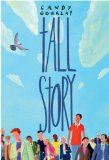Summary | Excerpt | Reading Guide | Reviews | Beyond the book | Read-Alikes | Genres & Themes | Author Bio

Lately I've found I have a taste for historical novels, something I haven't read much of since I was a teenager. It took a few books before I saw a connection that explained why I craved them: the lack of modern technology - no email, no internet, no instant messages, no computer games. I find this very relaxing.
This is not to say that The Year the Swallows Came Early is an historical novel. Rather it has a wonderfully appealing sense of timelessness. When exactly it takes place is not so important; its setting, on the other hand, is vital: the area of San Juan Capistrano, California, where the swallows return each year from Argentina.
Groovy (nicknamed at age two by her father), but named Eleanor Robinson after her great-grandmother, a science fiction writer (author Fitzmaurice's grandmother, Eleanor Robinson, was a science fiction writer) lives in "a perfect stucco house, just off the sparkly Pacific, with a lime tree in the backyard and pink and yellow roses gone wild around a picket fence." She loves her parents and, at age eleven, isn't happy that her mother and father have separated (he's a gambler and can't keep a job) and thus compares her beautiful-seeming home to "one of those See's candies with beautiful swirled chocolate on the outside, but sometimes hiding coconut flakes on the inside, all gritty and hard, like undercooked white rice."
But things are about to get much worse. While walking her father to his new job, Groovy witnesses his arrest by one of the town's two policemen. First, she learns her mother is the person who caused him to be arrested, and then, after a long day of waiting, she discovers that her father gambled away her inheritance from her grandmother, money she had planned on to put her through cooking school.
Groovy has a series of believable reactions to all of this bad news, including the request to be called Eleanor instead of Groovy. She has to learn that the world doesn't stop when her heart is broken and her future unsure. "I hung up the phone and thought how people were still celebrating birthdays and ordering food platters, and how things went on at their own speed no matter what sort of terrible news just got told." She's helped through it by her friends Frankie and Luis, who run the Swallow Shop & Ferry and become the first paying customers for her chocolate-covered strawberries. They provide other work for her, her wonderfully confident classmate, the swallow artist Marisol, and Marisol's younger brother Felix who acts as her pint-sized publicist. Her father's imprisonment isn't the only blot on the landscape either: it looks like Frankie's mother, who abandoned him to deep-sea fish with her new husband, wants back into his life; there's the hot, hot weather; and then an earthquake.
Three things stood out for me in this book: the strong sense of vocation that both Groovy and Marisol have, that parents are allowed to be fully human without that fact excusing their harmful actions, and that making lists can have a therapeutic effect.
Groovy wants to go to cooking school.
I would learn how to dice vegetables without lifting the top of the knife off the cutting board, like they do on TV, and use a real flaming kitchen torch, and make pastry cream that comes out all fancy from a bag. I would use a zester to make the skins of lemons float off like confetti onto the tops of pies and cookies. I would write a cookbook, listing my perfect menus for every situation, the ones I'd copied into my notebook.
Marisol is confident of her future as a painter. Her paintings are displayed in her father's restaurant (where one has been sold) and on local sidewalks. She expects to be shown in galleries "soon." Groovy sees her as "someone who believed in almost impossible things happening." The ambitions of both characters are treated as normal and their right to them respected.
Although Groovy's father is largely absent from the action, his presence is felt through both plot details and the clear, distressed love both his long-suffering wife and newly bereft daughter feel for him. Her mother has had the uncomfortable role of truth-teller and steady provider all Groovy's life. Groovy recognizes their differences, but generally copes. Her mother "was more apt to believe in superstitions and her [astrological] signs rather than Jesus Christ, our Lord and Savior. She said it was the Louisiana in her."
When Groovy is eventually hit with depression after losing what represented her future, her mother tells her, "'You need to start making lists. It's the only way to get through the day.'" Groovy tries cheating, but her mother sees the half-heartedness of her fake lists. "Mama said she wanted me to write down more important things than routine tasks. Things like learning how to paint desert landscapes with barrel cacti and purple-orange sunsets by number. Or something really valuable like memorizing the constellations." Groovy figures out her own kind of list:
"food that reminded me of things." I am a lifetime listmaker and found this absolutely convincing; I also strongly relate childhood events with foods or meals.
One of the most satisfying elements of The Year the Swallows Came Early is Kathryn Fitzmaurice's refusal to tie up all the plot lines. It's a confident thing to do in a first novel, but it works. The readers - of any age - of The Year the Swallows Came Early will know that "they lived happily ever after" is one of the things that makes a fairy tale a fairy tale.
![]() This review was originally published in The BookBrowse Review in May 2009, and has been updated for the
July 2011 edition.
Click here to go to this issue.
This review was originally published in The BookBrowse Review in May 2009, and has been updated for the
July 2011 edition.
Click here to go to this issue.

If you liked The Year the Swallows Came Early, try these:

by Candy Gourlay
Published 2012
In a novel packed with quirkiness and humor, Gourlay explores a touching sibling relationship and the clash of two very different cultures.

If a Tree Falls at Lunch Period
by Gennifer Choldenko
Published 2009
Two worlds collide in one compelling story set in a suburban American middle-school. Kirsten's world is crumbling. Her parents are barely speaking to one another and her best friend has come under the spell of the queen bee Brianna. Walker's goal is to survive the new very white private school his mom has sent him to because she thinks he's going ...
Your guide toexceptional books
BookBrowse seeks out and recommends the best in contemporary fiction and nonfiction—books that not only engage and entertain but also deepen our understanding of ourselves and the world around us.